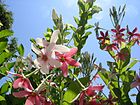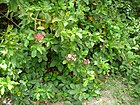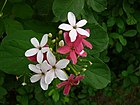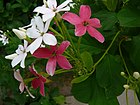Note: This is a project under development. The articles on this wiki are just being initiated and broadly incomplete. You can Help creating new pages.
Difference between revisions of "Quisqualis indica"
(→References) |
|||
| Line 1: | Line 1: | ||
[[File:Quisqualis indica 0007.jpg|thumb|right]] | [[File:Quisqualis indica 0007.jpg|thumb|right]] | ||
| + | '''Combretum indicum''' is a vigorous, fast-growing, climbing shrub growing up to 8 metres tall. The much-branched stems can grow up to 20 metres long in tropical climates. The plant is a popular traditional medicine and is also grown as an ornamental hedge. It is widely cultivated in the tropics and subtropics, sometimes also in the warm temperate zone, as an ornamental climber for clothing arches, climbing into trees etc. | ||
==Uses== | ==Uses== | ||
| − | {{Uses|Dysentery}}. | + | {{Uses|Dysentery}}, {{Uses|Ascarids}}, {{Uses|Nausea}}, {{Uses|Hiccough}}, {{Uses|Unconsciousness}}, {{Uses|Toothache}}, {{Uses|Vomiting}}, {{Uses|Diarrhoea}}, {{Uses|Skin diseases}}, {{Uses|Boils}}, {{Uses|Sores}}, {{Uses|Rheumatism}}.<ref name="Uses"/> |
==Parts Used== | ==Parts Used== | ||
| Line 27: | Line 28: | ||
==Habit== | ==Habit== | ||
| − | {{Habit|}} | + | {{Habit|Climber}} |
==Identification== | ==Identification== | ||
| Line 40: | Line 41: | ||
==Mode of Propagation== | ==Mode of Propagation== | ||
| − | {{Propagation|}} | + | {{Propagation|Seeds}}, {{Propagation|Softwood cuttings}}. |
==How to plant/cultivate== | ==How to plant/cultivate== | ||
| − | <ref name="How to plant/cultivate"/> | + | Succeeds in the tropical, subtropical and warm temperate zones. Succeeds in full sun or partial shade.<ref name="How to plant/cultivate"/> |
==Commonly seen growing in areas== | ==Commonly seen growing in areas== | ||
| − | {{Commonly seen|}}, {{Commonly seen|}}, {{Commonly seen|}}, {{Commonly seen|}}, {{Commonly seen|}}. | + | {{Commonly seen|Rain forests}}, {{Commonly seen|Low woods}}, {{Commonly seen|Thickets}}, {{Commonly seen|Hedges}}, {{Commonly seen|Mountains}}, {{Commonly seen|Dry hillsides}}, {{Commonly seen|Riversides}}, {{Commonly seen|Roadsides}}, {{Commonly seen|Wasteland}}. |
==Photo Gallery== | ==Photo Gallery== | ||
| Line 58: | Line 59: | ||
==References== | ==References== | ||
<references> | <references> | ||
| − | |||
<ref name="Common names">Karnataka Medicinal Plants Volume - 2 by Dr.M. R. Gurudeva, Page No. 615</ref> | <ref name="Common names">Karnataka Medicinal Plants Volume - 2 by Dr.M. R. Gurudeva, Page No. 615</ref> | ||
| − | + | <ref name="How to plant/cultivate">Useful tropical plants</ref> | |
| − | + | <ref name="Uses">Karnataka Medicinal Plants Volume - 2 by Dr.M. R. Gurudeva, Page No. 616</ref> | |
| − | |||
| − | <ref name="How to plant/cultivate"> | ||
| − | |||
</references> | </references> | ||
| Line 70: | Line 67: | ||
* [ ] | * [ ] | ||
* [ ] | * [ ] | ||
| − | + | ||
[[Category:Herbs]] | [[Category:Herbs]] | ||
[[Category:Pages without herbs images]] | [[Category:Pages without herbs images]] | ||
Revision as of 16:43, 18 August 2021
Combretum indicum is a vigorous, fast-growing, climbing shrub growing up to 8 metres tall. The much-branched stems can grow up to 20 metres long in tropical climates. The plant is a popular traditional medicine and is also grown as an ornamental hedge. It is widely cultivated in the tropics and subtropics, sometimes also in the warm temperate zone, as an ornamental climber for clothing arches, climbing into trees etc.
Contents
- 1 Uses
- 2 Parts Used
- 3 Chemical Composition
- 4 Common names
- 5 Properties
- 6 Habit
- 7 Identification
- 8 List of Ayurvedic medicine in which the herb is used
- 9 Where to get the saplings
- 10 Mode of Propagation
- 11 How to plant/cultivate
- 12 Commonly seen growing in areas
- 13 Photo Gallery
- 14 References
- 15 External Links
Uses
Dysentery, Ascarids, Nausea, Hiccough, Unconsciousness, Toothache, Vomiting, Diarrhoea, Skin diseases, Boils, Sores, Rheumatism.[1]
Parts Used
Chemical Composition
Common names
| Language | Common name |
|---|---|
| Kannada | Rangun Raani |
| Hindi | Rangun ki bel |
| Malayalam | |
| Tamil | Irangun malli |
| Telugu | Ranguni malle |
| Marathi | |
| Gujarathi | |
| Punjabi | |
| Kashmiri | |
| Sanskrit | |
| English | Rangoon creeper |
Properties
Reference: Dravya - Substance, Rasa - Taste, Guna - Qualities, Veerya - Potency, Vipaka - Post-digesion effect, Karma - Pharmacological activity, Prabhava - Therepeutics.
Dravya
Rasa
Guna
Veerya
Vipaka
Karma
Prabhava
Habit
Identification
Leaf
| Kind | Shape | Feature |
|---|---|---|
Other features
List of Ayurvedic medicine in which the herb is used
Where to get the saplings
Mode of Propagation
How to plant/cultivate
Succeeds in the tropical, subtropical and warm temperate zones. Succeeds in full sun or partial shade.[3]
Commonly seen growing in areas
Rain forests, Low woods, Thickets, Hedges, Mountains, Dry hillsides, Riversides, Roadsides, Wasteland.
Photo Gallery
References
External Links
- [ ]
- [ ]
- Ayurvedic Herbs known to be helpful to treat Dysentery
- Ayurvedic Herbs known to be helpful to treat Ascarids
- Ayurvedic Herbs known to be helpful to treat Nausea
- Ayurvedic Herbs known to be helpful to treat Hiccough
- Ayurvedic Herbs known to be helpful to treat Unconsciousness
- Ayurvedic Herbs known to be helpful to treat Toothache
- Ayurvedic Herbs known to be helpful to treat Vomiting
- Ayurvedic Herbs known to be helpful to treat Diarrhoea
- Ayurvedic Herbs known to be helpful to treat Skin diseases
- Ayurvedic Herbs known to be helpful to treat Boils
- Ayurvedic Herbs known to be helpful to treat Sores
- Ayurvedic Herbs known to be helpful to treat Rheumatism
- Herbs with Unriped fruit used in medicine
- Herbs with Seeds used in medicine
- Herbs with common name in Kannada
- Herbs with common name in Hindi
- Herbs with common name in Tamil
- Herbs with common name in Telugu
- Herbs with common name in English
- Habit - Climber
- Index of Plants which can be propagated by Seeds
- Index of Plants which can be propagated by Softwood cuttings
- Herbs that are commonly seen in the region of Rain forests
- Herbs that are commonly seen in the region of Low woods
- Herbs that are commonly seen in the region of Thickets
- Herbs that are commonly seen in the region of Hedges
- Herbs that are commonly seen in the region of Mountains
- Herbs that are commonly seen in the region of Dry hillsides
- Herbs that are commonly seen in the region of Riversides
- Herbs that are commonly seen in the region of Roadsides
- Herbs that are commonly seen in the region of Wasteland
- Herbs
- Pages without herbs images




